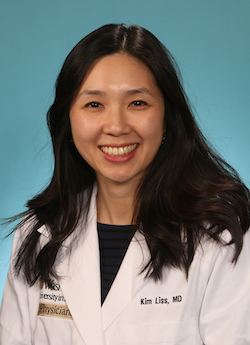5 physician-scientists named inaugural Dean’s Scholars
Program supports doctors who want to conduct basic science research
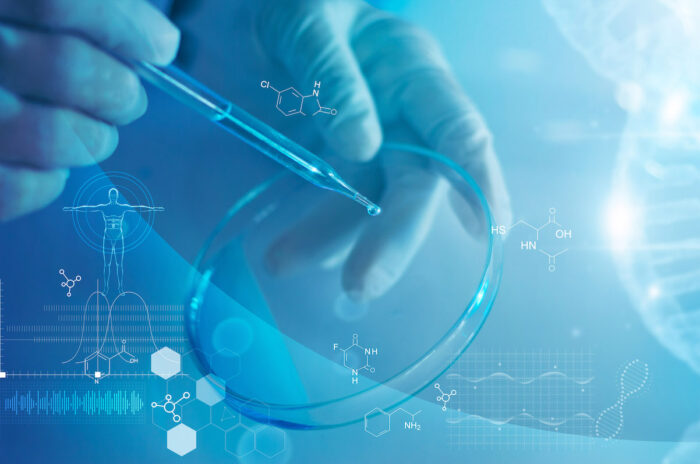 Getty images
Getty imagesThe newly formed Division of Physician-Scientists at Washington University School of Medicine in St. Louis has selected five physicians for its inaugural Dean’s Scholar Program. The aspiring physician-scientists will receive up to two years of financial support and mentorship, as well as dedicated lab time to conduct scientific research.
The newly formed Division of Physician-Scientists at Washington University School of Medicine in St. Louis has selected five physicians for its inaugural Dean’s Scholar Program, which provides up to two years of financial support and mentorship to aspiring, early-career physician-scientists, along with dedicated time for conducting laboratory research.
The program represents one of the division’s first major efforts to address a nationwide shortage of physician-scientists by nurturing the career development of physicians who treat patients but also want to pursue laboratory-based biomedical research.
Physician-scientists are considered crucial to developing new therapeutics and approaches to diagnosing and treating disease. But their numbers are declining, with only 1.5% of U.S. physicians today conducting research, according to the nonprofit Physician-Scientist Support Foundation. While many physician-scientists hold both a medical degree and a doctoral degree, the Dean’s Scholar awards are targeted to strengthening the research skills of those who have earned only a medical degree.
“Our Dean’s Scholars have distinguished themselves as impressive MDs who also show exceptional talent and career promise in basic scientific research,” said David H. Perlmutter, MD, executive vice chancellor for medical affairs, the George and Carol Bauer Dean of the School of Medicine, and the Spencer T. and Ann W. Olin Distinguished Professor. “By supporting their success as physician-scientists, the medical school is reaffirming its legacy as a leader in developing, nurturing and producing influential physician-researchers.”
The Dean’s Scholar Program began to take shape in the fall, after the Burroughs Wellcome Fund — a nonprofit organization that supports biomedical science through research and education — selected the School of Medicine to receive a prestigious, $2.5 million Physician-Scientist Institutional Award. Aimed primarily at MD-only physicians performing basic science research, the grant provides seed funding over five years that the division will use to help support the Dean’s Scholars program, and enrichment activities for physician-scientists in training.
The School of Medicine and its departments plan to bolster the program further with an additional $6.6 million to supplement goals of the Burroughs Wellcome Fund grant.
The five Dean’s Scholars underwent a competitive application process that required interviews with senior faculty and presentations of their proposed research projects. The awardees are:
-
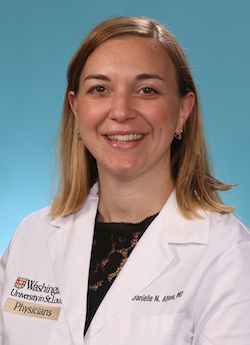 Alfano
AlfanoDanielle Alfano, MD, an instructor of pediatrics in the Division of Newborn Medicine. Her research will focus on exploring the molecular pathways of potential pathogens involved in sepsis, a common and often deadly disease. In particular, she will examine the interaction between pathogens and a protein known as ADAM10 in endothelial cells. Her mentor is Juliane Bubeck Wardenburg, MD, PhD, director of the Division of Pediatric Critical Care, and a professor of pediatrics.
-
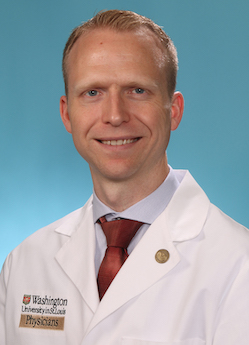 Brogan
BroganDavid M. Brogan, MD, an assistant professor in the Department of Orthopaedic Surgery. His research will aim to develop a technique to assess peripheral nerve damage in badly injured limbs. He also plans to tap into his expertise in microsurgery, with plans to create custom-made, molecular imaging probes to improve diagnosis and treatment of peripheral nerve damage. His mentor is Samuel Achilefu, PhD, the Michel M. Ter-Pogossian Professor of Radiology, as well as a professor of medicine, of biochemistry and molecular biophysics, and of biomedical engineering.
-
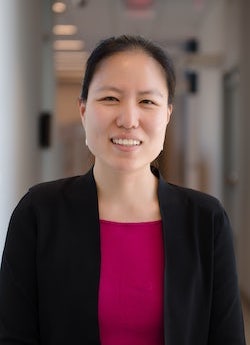 Kim
KimMiriam Y. Kim, MD, an instructor in the Division of Oncology. Her research will focus on new immunotherapy approaches to treating acute myeloid leukemia using gene- and cell-based therapy techniques. Specifically, she will develop chimeric antigen receptor T cells (CAR-T cells) to treat blood cell cancers. Her mentor is John DiPersio, MD, PhD, director of the Division of Oncology and deputy director of Siteman Cancer Center at Barnes-Jewish Hospital and Washington University School of Medicine in St. Louis, as well as the Virginia E. and Sam J. Golman Professor of Medicine.
- Kim H.H. Liss, MD, an instructor of
pediatrics in the Division of Gastroenterology, Hepatology & Nutrition. She will investigate the relationship between lipids and liver ischemia-reperfusion injury, which occurs when blood supply to the liver is temporarily interrupted. A better understanding of how injury occurs in fatty livers may facilitate improved treatment. Her mentor is Brian Finck, PhD, an associate professor of medicine.
-
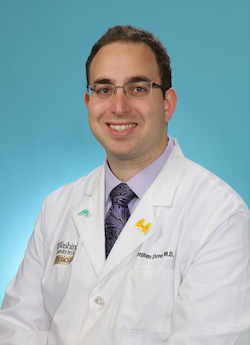 Stone
StoneStephen I. Stone, MD, an instructor of pediatrics in the Division of Pediatric Endocrinology and Diabetes. His research will delve into the role of specific genetic mutations in insulin resistance in diabetic patients, as well as potential therapies involving gene editing. His research was inspired by a young patient with a rare syndrome that causes extreme insulin resistance. His mentor is David Ornitz, MD, PhD, an Alumni Endowed Professor of Developmental Biology.
“Many doctors become intrigued with research after treating a patient whose condition they want to learn more about; however, it may be difficult to find the guidance and support necessary to become a successful physician-scientist,” said Wayne M. Yokoyama, MD, an associate dean, director of the new Division of Physician-Scientists, and the Sam J. Levin and Audrey Loew Levin Professor of Arthritis Research.
“As an MD-only physician-scientist myself, I understand the unique challenges that this career path presents,” said Yokoyama, who is internationally recognized for his research on a type of immune cell called natural killer cells. “While Washington University has a very strong MD/PhD program, earning an MD/PhD is not the only route to becoming a physician-scientist. It is a great choice for those who are ready to make the commitment either before or during medical school. For others, the Dean’s Scholar Program offers strong support for this career path, including positioning MDs to be competitive for career development awards from the National Institutes of Health (NIH) and other funding sources.”




